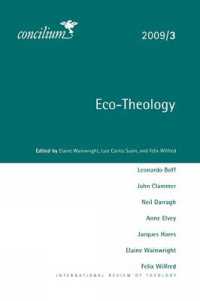Full Description
Based on a critique of liberal and libertarian contradictions with their conflictual consequences and on analyses of critical social theories and perspectives from the Global South (Latin America, Africa, and Asia), as well as the Global North, this book seeks to address tensions of global social misrecognition and injustice. It deals with the dispute over particular and universal norms on local, regional, and global levels, extra-territorial social recognition of the global poor, strategic socialism, threats of global hegemony, authoritarianism, and war in light of various conflicts.
Contents
Acknowledgements
List of Tables
About Towards Justice
Introduction
Part 1
Founding a Critical Theory
1 Social Critique
1 Internal Social Criticism
2 The Trichotomy of Critique, Explanation, and Normativity
3 External Social Criticism
2 Critical Methods
1 Transdisciplinary Approaches
2 The Realism of Societal Development
3 Structures, Actors, and Processes in History
Part 2
Development of Critical Theory
3 The Programme of Critical Theory
1 Horkheimer's Foundations
2 Marcuse's Foundations
3 Adorno and Horkheimer's Redefinition
4 Critical Paradigms
1 Work and Eros
2 Communication and Recognition
3 Global Interactions
Part 3
Limits of Liberal Liberty
5 Deficits of National Liberty
1 Inadequacies of Public Reason
2 Problems of Individualism and Instrumental Reason
3 Shortcomings of Redistribution
4 Marginalisation of Redistribution and the Problem of Ownership
6 Deficits of International Liberty
1 An Inadequate Relationship between an Individual and Community
2 Comparison of the Principles of Justice
2.1 Principles of International Justice in a Theory of Justice
2.2 Principles of International Justice in the Law of Peoples
2.3 Principles Which Regulate Relations between Individuals within the National Framework in a Theory of Justice
3 Shortcomings of International Redistribution
4 Unsustainability of Liberal International Order
Part 4
Experience of Recognition
7 Dilemmas of Local Recognition
1 The Crystallisation of Recognition
2 From the Private Sphere to the Public Sphere
3 Political Public Sphere
4 Recognition of Equality and Difference
8 Dilemmas of Transnational Recognition
1 Interstate Recognition
2 Transcending Interstate Recognition
3 Transnational Recognition
4 Macro-regional Interactions
Part 5
Global Perspectives of Justice
9 Intercultural Polylogue: Cultural and Political Justice
1 Intercultural and Civilizational Polylogue
2 Dispute on the Universalism of Human Rights
3 Plurality of Cultures and Civilizations
4 Common Norms for Humanity
10 Extraterritorial, Strategic, and Global Interactions: Social, Economic, and Security Justice
1 An Identification of the Misrecognized Subjects
2 Extraterritorial Recognition: Regulation of the Economy
3 Transformative Revolution and Strategic Structures
4 Overcoming Global Conflicts
Conclusion: The Principles of a Theory of Global Social Justice
1 Social and Economic Justice
2 Political and Cultural Justice
References
Index







